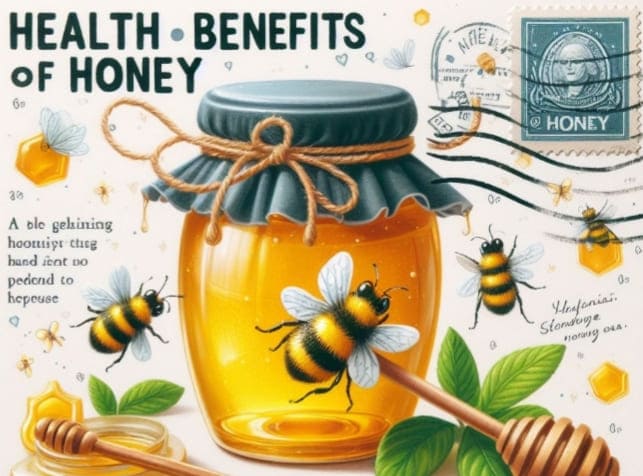
This article explores seven key benefits of honey during a cold and provide tips on how to optimize each the benefits for maximum effectiveness.
When it comes to natural remedies for a cold, honey has long been praised for its medicinal properties. Packed with beneficial nutrients, honey can provide relief and support your immune system during a cold.
Benefits of Honey During a Cold
Here are seven (7) amazing benefits of honey during a cold:
1. Soothes Sore Throats
Honey has a thick, syrupy consistency that can coat and soothe sore throats. It also contains a number of antibacterial and antiviral compounds that can help to kill bacteria and viruses that cause sore throats.
One of the most effective ways to use honey for sore throats is to gargle with a mixture of honey and warm water. Gargling with honey water helps to coat the throat and soothe the pain and irritation. It also helps to kill bacteria and viruses that may be causing the sore throat.
Optimization Tip: To maximize the soothing benefits of honey for sore throats, mix 1-2 tablespoons of honey in a cup of warm water and gargle for 30 seconds. You can also add honey to tea or hot lemon water to help soothe your throat.
Don’t Miss:
- Benefits of Honey Over Sugar
- Health Benefits Of Yemeni Honey
- Health Benefits of Honey Chai Turmeric Tea
- Benefits of Honey While Sick
- Benefits Of Honey and Himalayan Salt
- The Benefits of Honey for Women’s Weight Loss
- Benefits of Taking Honey Before Running
2. Suppresses Coughs
Honey has a number of compounds that can help to suppress coughs. These compounds include:
- Dextromethorphan: Dextromethorphan is a cough suppressant that is found in many over-the-counter cough medicines. Honey contains a natural form of dextromethorphan that can help to suppress coughs.
- Guaifenesin: Guaifenesin is an expectorant that helps to thin mucus and make it easier to cough up. Honey contains a natural form of guaifenesin that can help to suppress coughs.
In addition to these compounds, honey also contains a number of other compounds that can help to soothe coughs, such as:
- Antioxidants: Honey contains a number of antioxidants that can help to reduce inflammation and protect the lungs from damage.
- Antibacterial and antiviral compounds: Honey contains a number of antibacterial and antiviral compounds that can help to kill bacteria and viruses that cause coughs.
Optimization Tip: To maximize the cough-suppressing benefits of honey, take 1-2 tablespoons of honey before bed. You can also add honey to tea or hot lemon water to help soothe your throat and suppress your cough.
3. Boosts Immunity
Honey contains a number of antioxidants and antibacterial compounds that can help to boost immunity. These compounds include:
- Phenolic acids: Phenolic acids are antioxidants that have been shown to boost immunity and protect against infection.
- Flavonoids: Flavonoids are antioxidants that have been shown to boost immunity and reduce inflammation.
- Hydrogen peroxide: Hydrogen peroxide is an antibacterial compound that has been shown to kill bacteria and viruses.
In addition to these compounds, honey also contains a number of other compounds that can help to boost immunity, such as:
- Probiotics: Honey contains a number of probiotics, which are beneficial bacteria that can help to improve gut health and boost immunity.
- Vitamins and minerals: Honey contains a number of vitamins and minerals that are essential for a healthy immune system, such as vitamin C, zinc, and selenium.
Optimization Tip: To maximize the immunity-boosting benefits of honey, consume 1-2 tablespoons of honey per day. You can add honey to tea, yogurt, or oatmeal, or you can take it on its own.
4. Reduces Inflammation
Honey contains a number of anti-inflammatory compounds that can help to reduce inflammation in the body. These compounds include:
- Quercetin: Quercetin is a flavonoid that has been shown to reduce inflammation and pain.
- Kaempferol: Kaempferol is a flavonoid that has been shown to reduce inflammation and muscle damage.
- Galangin: Galangin is a flavonoid that has been shown to reduce inflammation and pain.
In addition to these compounds, honey also contains a number of other compounds that can help to reduce inflammation, such as:
- Antioxidants: Honey contains a number of antioxidants that can help to reduce inflammation and protect cells from damage.
- Probiotics: Honey contains a number of probiotics, which are beneficial bacteria that can help to improve gut health and reduce inflammation.
Optimization Tip: To maximize the anti-inflammatory benefits of honey, consume 1-2 tablespoons of honey per day. You can add honey to tea, yogurt, or oatmeal, or you can take it on its own.
5. Improves Sleep
Honey contains tryptophan, an amino acid that helps to promote sleep. Consuming honey before bed can help you to fall asleep more easily and get a better night’s sleep. Getting enough sleep is essential for recovery from a cold, as it helps to repair tissues and boost immunity.
In addition to tryptophan, honey also contains a number of other compounds that can help to improve sleep, such as:
- Magnesium: Magnesium is a mineral that helps to relax muscles and promote sleep.
- B vitamins: B vitamins are essential for the production of melatonin, a hormone that helps to regulate sleep.
Optimization Tip: To maximize the sleep-improving benefits of honey, consume 1-2 tablespoons of honey before bed. You can also add honey to tea or hot lemon water to help you relax and fall asleep more easily.
6. Provides Energy
Honey is a good source of carbohydrates, which are the body’s primary source of energy. Consuming honey can help to boost your energy levels and improve your overall well-being.
In addition to carbohydrates, honey also contains a number of other nutrients that can help to provide energy, such as:
- Vitamins: Honey contains a number of vitamins that are essential for energy production, such as vitamin C, B vitamins, and niacin.
- Minerals: Honey contains a number of minerals that are essential for energy production, such as iron, magnesium, and potassium.
Optimization Tip: To maximize the energy-boosting benefits of honey, consume 1-2 tablespoons of honey in the morning or afternoon. You can add honey to tea, yogurt, or oatmeal, or you can take it on its own.

7. Hydrates the Body
Honey is a natural humectant, which means that it helps to retain moisture. Consuming honey can help to hydrate your body and prevent dehydration.
In addition to being a humectant, honey also contains a number of other compounds that can help to hydrate the body, such as:
- Water: Honey is about 17% water, which can help to hydrate the body.
- Electrolytes: Honey contains a number of electrolytes, such as sodium, potassium, and magnesium, which can help to regulate fluid balance in the body.
Optimization Tip: To maximize the hydrating benefits of honey, consume 1-2 tablespoons of honey per day. You can add honey to tea, yogurt, or oatmeal, or you can take it on its own.
Overall, honey is a safe and effective natural remedy for a variety of cold symptoms. It can help to soothe sore throats, suppress coughs, boost immunity, reduce inflammation, improve sleep, provide energy, and hydrate the body. By consuming honey during a cold, you can help to relieve your symptoms and get back to feeling your best.
Note: While honey shows promise in easing cold symptoms, it is essential to note that it is not a cure for the common cold. However, its natural properties make it a valuable option for symptom relief during colds. Always consult with a healthcare provider before using honey or any other home remedy for medical purposes.ng a cold, you can help to relieve your symptoms and get back to feeling your best.
Ways to incorporate honey into meals to maximize its benefits during a cold

Here are some other ways to incorporate honey into meals to maximize its benefits during a cold:
1. Warm Lemon Honey Water:
Create a comforting beverage by combining warm water with freshly squeezed lemon juice and a tablespoon of honey. This concoction helps soothe a sore throat, provides vitamin C for immune support, and offers hydration.
2. Honey-Ginger Tea:
Brew a cup of ginger tea by steeping fresh ginger slices in hot water. Add honey to taste for sweetness and extra throat-soothing benefits. Ginger’s anti-inflammatory properties complement honey’s soothing effects, making it an excellent choice for cold relief.
3. Honey-Infused Oatmeal:
Stir a spoonful of honey into a bowl of warm oatmeal for a nutritious and comforting breakfast. Oatmeal provides fiber to support digestion, while honey adds sweetness and helps alleviate throat irritation.
4. Honey-Garlic Chicken Soup:
Enhance the flavor and immune-boosting properties of chicken soup by adding a drizzle of honey and minced garlic. Honey adds a touch of sweetness, while garlic provides antimicrobial benefits to fight off cold symptoms.
5. Honey-Yogurt Parfait:
Layer Greek yogurt with honey and your choice of fruits and nuts for a nutritious and soothing snack. Yogurt contains probiotics to support gut health, while honey adds sweetness and helps alleviate throat discomfort.
Also Checkout:
- Benefits of Honey for Diabetics Everyone Should Know
- Benefits of Honey for Stomach (Gut Health) and How to Maximize Their Effectiveness
- Benefits of Honey to the Brain
- Health Benefits of Adding Honey to Tea
- Health Benefits Of Honey For Kids
- Benefits of Honey Lavender Tea
- Benefits of Honey Mustard and Recipe
- Honey Sticks: Benefits, Types, Recipe and Uses
- Health Benefits of Honey Wheat Bread And Recipes
- Honeybush Tea: Benefits and Preparation
- Benefits of Honey Bath You Should Know About
- Benefits of Eating Honey During Pregnancy
Some types of honey are more effective for soothing a sore throat than others. Manuka honey is a type of honey that is produced in New Zealand. It has a high concentration of antibacterial and antiviral compounds, which makes it particularly effective for soothing sore throats. Buckwheat honey is another type of honey that is effective for soothing sore throats. It has a dark color and a strong flavor, but it is also very effective at killing bacteria and viruses.
References:
[1] https://www.health.harvard.edu/staying-healthy/got-a-cold-try-some-honey
[2] https://www.mayoclinic.org/symptoms/cough/expert-answers/honey/faq-20058031
[3] https://www.cnn.com/2020/08/19/health/honey-common-cold-cough-treatment-scn-wellness-scli-intl/index.html
[4] https://www.verywellhealth.com/can-cinnamon-and-honey-cure-the-common-cold-770395
[5] https://www.ncbi.nlm.nih.gov/pmc/articles/PMC3601686/







































